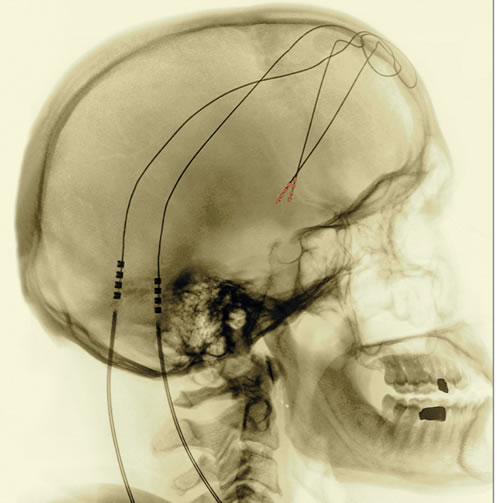
Image: Stockxpert
Women who fall pregnant while dieting are more likely to have a child that could become obese or diabetic in later life, new research suggests.
While the study was carried out in sheep, University of Manchester scientists suspect the findings may hold true for humans as well. The research, carried out with colleagues in New Zealand and Canada, may also have found a reason why human twins are more likely to develop type-2 diabetes in adulthood after the team studied twin lambs.
The study investigated twin pregnancies in sheep, as well the pregnancies of ewes that received less food around the time the lamb was conceived. The researchers then looked at tissues from the brains of the unborn lambs. This was to see if there were changes in the structure of the DNA that would alter genes involved in food intake and glucose levels after birth.
“We found that unborn twin lambs had changes in the structure of DNA in the region of the brain that regulates food intake and glucose that resulted in an increased chance of diabetes in adulthood,” said study lead Anne White, Professor of Endocrine Sciences.
“Our findings provide a reason why twins are more likely to get diabetes but we have also shown that mothers who don’t have enough food around the time of conception may have a child who grows up with an increased risk of obesity.” [continue reading…]
Negative thinking is a red flag for clinical depression. Stopping such thoughts early on can save millions of people from mental illness,according research study from the Frances Payne Bolton School of Nursing at Case Western Reserve University.
Jaclene Zauszniewski, the Kate Hanna Harvey Professor in Community Health Nursing and associate dean for doctoral education at the school, has developed a brief 8-item survey to help healthcare providers identify depressive thinking patterns that may lead to serious depression if not identified and addressed early.
Zauszniewski’s Depression Cognition Scale (DCS) asks individuals to respond to questions about helplessness, hopelessness, purposelessness, worthlessness, powerlessness, loneliness, emptiness and meaninglessness using a scale that ranges from “strongly agree” to “strongly disagree.” [continue reading…]

(c) Foto: Universitätsklinikum Bonn Prof. Dr. Thomas E. Schläpfer
Brain pacemakers have a long-term effect in patients with the most severe depression. This has now been proven by scientists from the Bonn University Medical Center. Eleven patients took part in the study over a period of two to five years. A lasting reduction in symptoms of more than 50% was seen in nearly half of the subjects. A new perspective is thus opened for people with the most severe depression who do not respond to any other therapy. The results are now being presented in the current edition of the journal “Neuropsychopharmacology.”
People with severe depression are constantly despondent, lacking in drive, withdrawn and no longer feel joy. Most suffer from anxiety and the desire to take their own life. Approximately one out of every five people in Germany suffers from depression in the course of his/her life – sometimes resulting in suicide. People with depression are frequently treated with psychotherapy and medication. “However, many patients are not helped by any therapy,” says Prof. Dr. Thomas E. Schläpfer from the Bonn University Medical Center for Psychiatry and Psychotherapy. “Many spend more than ten years in bed – not because they are tired, but because they have no drive at all and they are unable to get up.”
One possible alternative is “deep brain stimulation,” in which electrodes are implanted in the patient’s brain. The target point is the nucleus accumbens – an area of the brain known as the gratification center. There, a weak electrical current stimulates the nerve cells. Brain pacemakers of this type are often used today by neurosurgeons and neurologists to treat ongoing muscle tremors in Parkinson’s disease. [continue reading…]

Image: iStockphoto
ince mental health disorders commonly develop in the teenage years, “Yoga may serve a preventive role in adolescent mental health,” according to the new study, led by Jessica Noggle, PhD, of Brigham and Women’s Hospital, Harvard Medical School, Boston.
Pilot Study Shows Improvements in Some Psychosocial Outcomes
Fifty-one 11th- and 12th-grade students registered for physical education (PE) at a Massachusetts high school were randomly assigned to yoga or regular PE classes. (Two-thirds were assigned to yoga.) Based on Kripalu yoga, the classes consisted of physical yoga postures together with breathing exercises, relaxation, and meditation. Students in the comparison group received regular PE classes.
Students completed a battery of psychosocial tests before and after the ten-week yoga program. In addition to tests of mood and tension/anxiety, both groups completed tests assessing the development of self-regulatory skills—such as resilience, control of anger expression, and mindfulness—thought to protect against the development of mental health problems.
Teens taking yoga classes had better scores on several of the psychological tests. Specifically, while students in regular PE classes tended to have increased scores for mood problems and anxiety, those taking yoga classes stayed the same or showed improvement. Negative emotions also worsened in students taking regular PE, while improving in those taking yoga. (There was no difference in a test of positive emotions.) [continue reading…]



